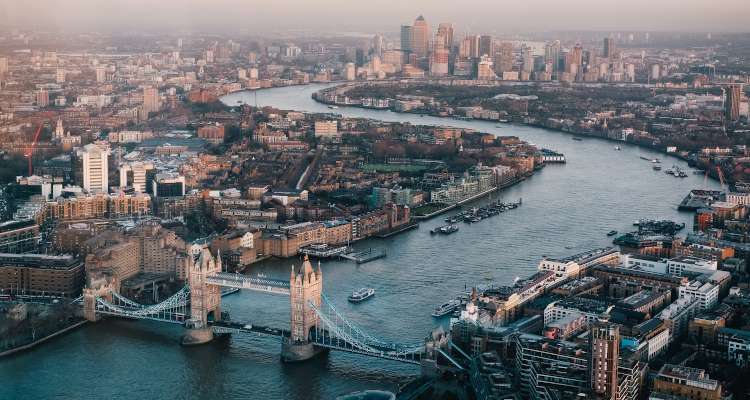The UK Nighttime Economy Has Lost Nearly 400,000 Jobs Amid the Pandemic — Including 86,000 Positions In the Cultural Nighttime Sector


An aerial shot of London, England, which has seen its nighttime live entertainment space part with a substantial number of jobs since 2020’s start, according to a study from the Night Time Industries Association. Photo Credit: Benjamin Davies
A newly released study is shedding light upon the “devastating impact” that COVID-19 lockdown measures have had on the UK’s nighttime sector, which lost an estimated 393,000 jobs between March of 2020 and June of 2021 – including 86,000 positions specifically in the nighttime “cultural economy.”
The Night Time Industries Association (NTIA) disclosed these and other discouraging figures in a just-published analysis entitled “A Study of the Night Time Economy.” NTIA higher-ups commissioned the report “to fully understand, for the first time, the economic contribution and significance of the night time cultural economy” within the broader UK economy, according to the roughly 40-page-long document.
NTIA CEO Michael Kill acknowledged at the study’s outset that the “past year has been incredibly tough for the vast majority of night time economy businesses,” with the entire UK economy having parted with some two percent of its jobs from Q1 2020 to Q2 2021 – compared to 20 percent of positions in the “food and accommodation” sectors.
It bears noting here that the term “nighttime cultural economy” (NTCE) as used in the multifaceted report refers to elements of the nighttime economy “that are driven by cultural and leisure activities,” such as concerts and other live entertainment happenings. The NTCE also has “less dependence upon retailing food and drink than the wider OHLE” (out of home leisure economy), whereas the nighttime economy itself encompasses “sub-sectors within the OHLE that primarily serve the evening or night time consumer – i.e., 6pm to 6am.”
The nighttime cultural economy accounted for 1.64 percent of the UK’s GDP in 2019 (£36.4 billion, or $49.53 billion at the present exchange rate), according to the analysis, against 5.1 percent for the overarching nighttime economy and 7.7 percent for the OHLE. Additionally, the nighttime cultural economy supported some 425,000 jobs and 38,000 businesses in the UK as of 2018, per the NTIA.
However, “the NTCE has lost proportionally more than other sectors” in the out of home leisure economy, the text proceeds, including an estimated total of almost £37 billion in “lost trade” across March of 2020 and June of 2021.
The entirety of the out of home leisure economy’s losses came in at an estimated £136 billion ($184.87 billion) during the same stretch, the report shows. And as initially mentioned, the UK’s OHLE has lost some 589,000 jobs amid the pandemic, compared to 393,000 for the nighttime economy and 86,000 for the nighttime cultural economy.
These latter stats are particularly significant because “historic trends” – that is, recent years’ growth patterns – suggested before COVID-19’s arrival that 2020 to 2024 would see the UK’s total OHLE jobs increase from 2.92 million to 3.26 million, per the NTIA. The NTCE, on the other hand, was expected to add 40,000 positions, for a total of 465,000 jobs.
Notwithstanding the ongoing rollback of lockdown orders, the gradual return of non-socially distanced live entertainment, and commercial growth in certain segments of the music industry, the NTIA’s report appears to reflect the substantial amount of lost ground that the crowd-based leisure space must make up in the coming months and years. And while the analysis only covers the UK economy, once again, lockdown measures have presumably had a similarly devastating impact on the nighttime (and daytime) live entertainment spheres in a large number of countries around the world.
